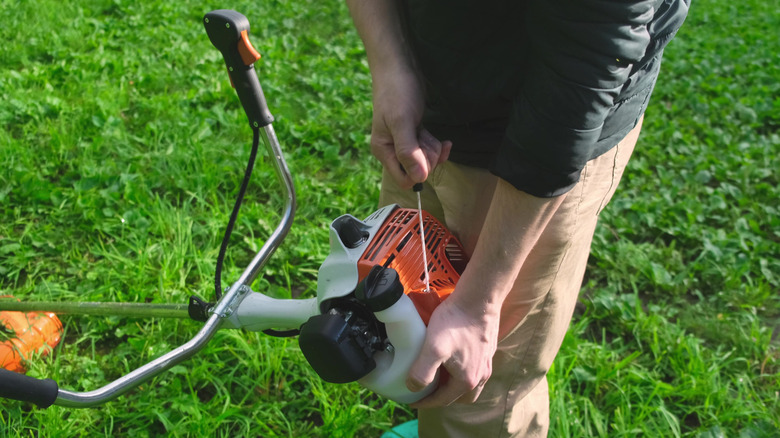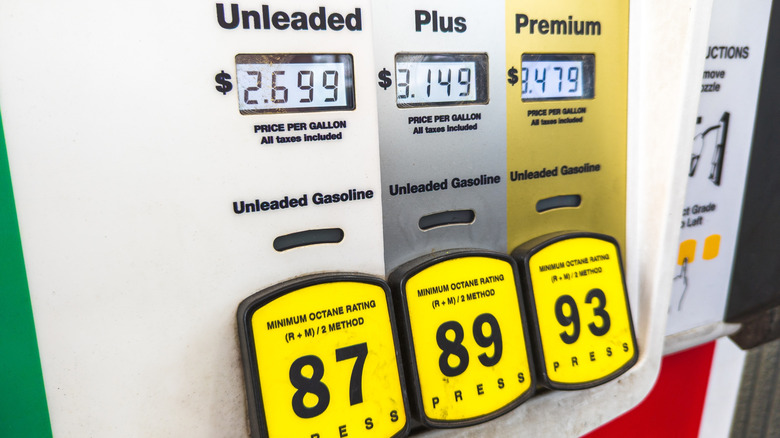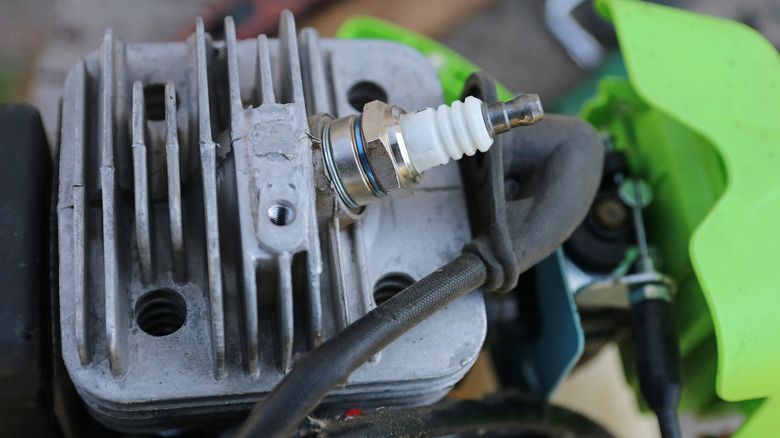Can You Use Premium Gas In A Weed Eater? Here's What Happens If You Do
When you think of premium gas, the chances are that you're not thinking of weed eaters, but rather exotic supercars with banks of cylinders and a roar that shakes the sidewalk. For instance, premium gas is recommended for most turbocharged cars. But surely, your lowly weed eater could do with a similar level of care? The short answer to this is no — while we never recommend neglecting your weed eater, feeding it premium fuel is not a good idea, and not one it would appreciate. The fact is that premium gas won't help your weed eater devour weeds faster, nor will it benefit the health of your weed eater's engine. Using premium fuel will damage your pocket immediately, and may, ultimately, do the same to your weed eater.
Premium gas differs from regular gas mostly in its octane rating, which is typically 90 or higher. For comparison, regular fuel is usually 87-octane fuel. Higher octane levels are often achieved by adding ethanol. High octane levels work best in high-compression engines like those found in performance vehicles, and one of its functions is to prevent engine knock. Not something that is relevant in a weed eater's low-compression two-stroke engine. Additionally, as we discuss in more detail later, ethanol can cause corrosion and other long-term problems in small engines.
What this means is that paying a premium price for gas is not helping your weed eater. In fact, it's also best to avoid premium gas in two-stroke engine powered tools like lawnmowers.
The problem with premium fuels
We've established that your weed eater isn't going to get a performance boost from premium gas. However, this could be overlooked if using premium fuel kept it running smoothly, and for longer. Sadly, this doesn't work either. The right additives in your fuel can help keep an engine healthy, but premium fuels don't necessarily contain better or more additives. As noted, the main factor that defines premium fuel is the octane level. The American Automobile Association found that additives, not octane levels, make the biggest differences in long-term engine health. The right balance of detergents and stabilizers is as likely to be found in any regular top-tier gasoline, as it is in premium gas.
Ethanol is added to most gasolines, and its presence is usually represented as a percentage at the pumps (e.g., fuels labelled as E10 contain 10 percent ethanol, E15 represents percent and so forth). However, the additive does have a downside; it can cause damage to your weed eater (ethanol can also damage car engines).
Ethanol is added to fuel for a range of reasons, including helping to increase the octane level and reducing emissions. Worthy virtues, but for your weed eater, these advantages have a distinct counterbalance. As noted, ethanol can harm low-compression engines like those found in garden equipment. Ethanol attracts water, and in low-compression engines, this can lead to corrosion, running problems, and poor lubrication. This is why companies like Husqvarna recommend using ethanol-free gas wherever possible.
Out of pocket
Another factor is cost. Okay, so it would be difficult to justify calling a weed eater a gas guzzler, but why shell out extra when there is no compelling reason to, and plenty of compelling reasons not to? At the time of writing, the average cost of regular fuel is $3.075, and the cost of premium is $3.942 (per U.S. gallon). At about $0.94 a gallon dearer, the costs will soon mount up. For example, when you consider that Husqvarna recommends you empty and replace the gas in your tank every two to three weeks (ethanol again), buying premium gas is literally just pouring good money down the drain.
However, if you really want to splash out and buy the best fuel for your weed eater, then a better option is to try and track down some ethanol-free fuel. Although this may be more expensive than regular gas (prices can vary from about 30 cents to one dollar more), the long-term savings may make the change worthwhile. To understand why this is the case, it's worth revisiting why ethanol can damage your engine. E10 rated gasoline absorbs up to 50 times more water than ethanol-free, which can lead to corroded engine parts. Additionally, the ethanol tends to separate from the gasoline, and when this happens, two-stroke oil remains bonded to the gasoline element but not to the ethanol. This leads to reduced lubrication and, ultimately, excess engine wear.
You can check out where to get ethanol-free gas in your area on the Pure Gas website.


